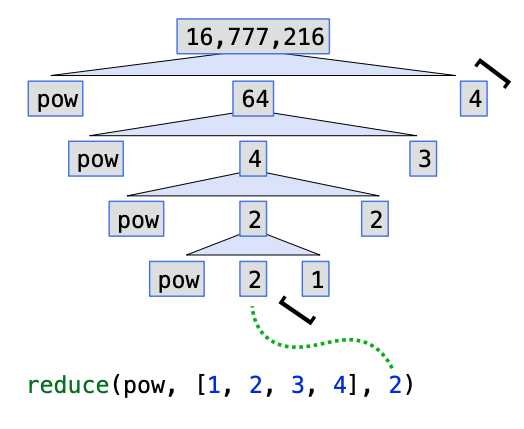Exceptions
- Press O or Escape for overview mode.
- Visit this link for a nice printable version
- Press the copy icon on the upper right of code blocks to copy the code
Class outline:
- Scheme: Programs as data
- Python: Exceptions
Programs as data
A Scheme Expression is a Scheme List
Scheme programs consist of expressions, which can be:
- Primitive expressions:
23.3#t+quotient - Combinations:
(quotient 10 2)(not #t)
The built-in Scheme list data structure can represent combinations:
(list 'quotient 10 2) ; (quotient 10 2)
(eval (list 'quotient 10 2)) ; 5
In such a language, it is straightforward to write a program that writes a program.
Quasiquotation
There are two ways to quote an expression:
- Quote:
'(a b)=>(a b) - Quasiquote:
`(a b)=>(a b)
They are different because parts of a quasiquoted expression can be unquoted with ,
(define b 4)
- Quote:
'(a ,(+ b 1))=>(a (unquote (+ b 1)) - Quasiquote:
`(a ,(+ b 1))=>(a 5)
Generating code
Quasiquotation is particularly convenient for generating Scheme expressions:
(define (make-adder n) `(lambda (d) (+ d ,n)))
(make-adder 2) ; (lambda (d) (+ d 2))
Exceptions
Handling errors
Sometimes, computer programs behave in non-standard ways.
- A function receives an argument value of an improper type
- Some resource (such as a file) is not available
- A network connection is lost in the middle of data transmission

Exceptions
An exception is a built-in mechanism in a programming language to declare and respond to "exceptional" conditions.
A program raises an exception when an error occurs.
If the exception is not handled, the program will stop running entirely.
But if a programmer can anticipate when exceptions might happen, they can include code for handling the exception, so that the program continues running.
Many languages include exception handling: C++, Java, Python, JavaScript, etc.
Exceptions in Python
Python raises an exception whenever a runtime error occurs.
How an unhandled exception is reported:
>>> 10/0
Traceback (most recent call last):
File "<stdin>", line 1, in
ZeroDivisionError: division by zero
If an exception is not handled, the program stops executing immediately.
Types of exceptions
A few exception types and examples of buggy code:
| Exception | Example |
|---|---|
OverflowError
| pow(2.12, 1000)
|
TypeError
| 'hello'[1] = 'j'
|
IndexError
| 'hello'[7]
|
NameError
| x += 5
|
FileNotFoundError
| open('dsfdfd.txt')
|
See full list in the exceptions docs.
The try statement
To handle an exception (keep the program running), use a try statement.
try:
<try suite>
except <exception class> as <name>:
<except suite>
...
The <try suite> is executed first.
If, during the course of executing the <try suite>, an exception is raised that is not handled otherwise, and
If the class of the exception inherits from <exception class>, then
the <except suite> is executed, with <name> bound to the exception.
Try statement example
try:
quot = 10/0
except ZeroDivisionError as e:
print('handling a', type(e))
quot = 0
Try inside a function
def div_numbers(dividend, divisor):
try:
quotient = dividend/divisor
except ZeroDivisionError:
print("Function was called with 0 as divisor")
quotient = 0
return quotient
div_numbers(10, 2)
div_numbers(10, 0)
div_numbers(10, -1)
What would Python Do?
def invert(x):
inverse = 1/x # Raises a ZeroDivisionError if x is 0
print('Never printed if x is 0')
return inverse
def invert_safe(x):
try:
return invert(x)
except ZeroDivisionError as e:
print('Handled', e)
return 0
invert_safe(1/0)
try:
invert_safe(0)
except ZeroDivisionError as e:
print('Handled!')
inverrrrt_safe(1/0)
Raising exceptions
Assert statements
Assert statements raise an exception of type AssertionError:
assert <expression>, <string>
Assertions are designed to be used liberally. They can be ignored to increase efficiency by running Python with the "-O" flag; "O" stands for optimized.
python3 -O
Raise statements
Any type of exception can be raised with a raise statement
raise <expression>
<expression> must evaluate to a subclass of BaseException or an instance of one
Exceptions are constructed like any other object. E.g., TypeError('Bad argument!')
Exercises
Exercise: Reduce
def reduce(f, s, initial):
"""Combine elements of s pairwise using f, starting with initial.
E.g., reduce(mul, [2, 4, 8], 1) is equivalent to mul(mul(mul(1, 2), 4), 8).
>>> reduce(mul, [2, 4, 8], 1)
64
"""

f: a two-argument functions: a sequence of values that can be the second argumentinitial: a value that can be the first argument
Exercise: Reduce (Solution 1)
def reduce(f, s, initial):
"""Combine elements of s pairwise using f, starting with initial.
>>> reduce(mul, [2, 4, 8], 1)
64
"""
if not s:
return initial
else:
first, rest = s[0], s[1:]
return reduce(f, rest, f(initial, first))

f: a two-argument functions: a sequence of values that can be the second argumentinitial: a value that can be the first argument
Exercise: Reduce (Solution 2)
def reduce(f, s, initial):
"""Combine elements of s pairwise using f, starting with initial.
>>> reduce(mul, [2, 4, 8], 1)
64
>>> reduce2(pow, [1, 2, 3, 4], 2)
16777216
"""
for x in s:
initial = f(initial, x)
return initial

f: a two-argument functions: a sequence of values that can be the second argumentinitial: a value that can be the first argument
Exercise: Divide all
def divide_all(n, ds):
"""Divide n by every d in ds.
>>> divide_all(1024, [2, 4, 8])
16.0
>>> divide_all(1024, [2, 4, 0, 8])
inf
"""
Use the reduce() function we just defined...
Exercise: Divide all (Solution)
def divide_all(n, ds):
"""Divide n by every d in ds.
>>> divide_all(1024, [2, 4, 8])
16.0
>>> divide_all(1024, [2, 4, 0, 8])
inf
"""
try:
return reduce(truediv, ds, n)
except ZeroDivisionError:
return float('inf')
Using the reduce() function we just defined.